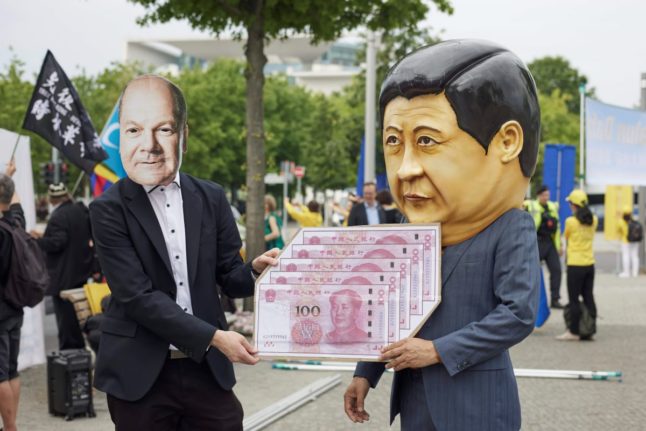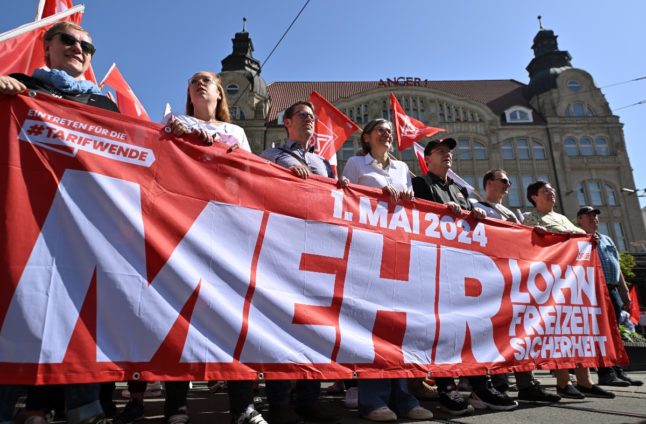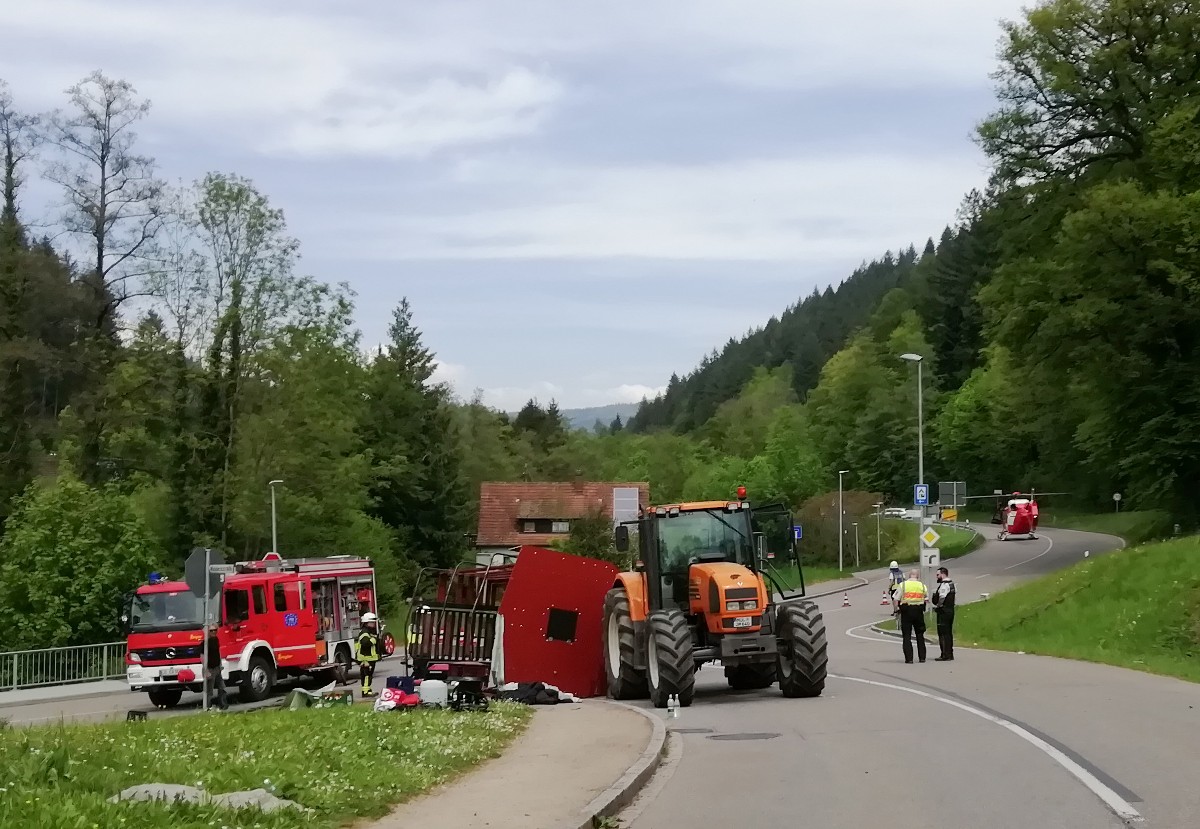Germany’s Scholz between tough talk and trade on China trip
Chancellor Olaf Scholz travels to China this weekend, walking a fine line in shoring up economic ties with Germany’s biggest trading partner at a time when the West is sharpening its tone towards Beijing.
With the economies of both China and Germany currently underperforming on the world stage, Scholz will travel with a bumper delegation of ministers and business executives.
The chancellor will have to balance encouraging words on economic cooperation with the European Union’s strident message accusing China of unfair subsidies.
The German leader could also deliver a stern warning to China over its refusal to turn its back on President Vladimir Putin despite Russia’s invasion of Ukraine.
China’s President Xi Jinping and Scholz will hold talks in the Chinese capital on Tuesday at the conclusion of the trip, which will first take the chancellor to Chongqing and Shanghai.
The three-day tour is Scholz’s second since taking office, the first coming in November 2022 with China still applying strict coronavirus rules.
Disruption as Munich Stammstreckentunnel closes this weekend
If you’re taking the S-Bahn in Munich at the weekend, you may have to look for alternatives because a main route is being closed off. The Stammstreckentunnel will be shut from Friday night (10:40pm) to Monday morning (4:40am.) No S-Bahn trains will be able to pass through.
This closure will happen again on the last weekend in April. It means that some routes will start or end early, and many trains will not stop at all stations. Passengers have to use regional trains, the U-Bahn and tram 19, which runs parallel to the main route. A rail replacement bus service has been set up between Ostbahnhof and Riem.
The reason for the closure is the track renewal at the Isartor and work on the new electronic signal box at Ostbahnhof.

European Parliament cancels immunity of an AfD MEP
The European Parliament has waived the immunity of AfD MEP Gunnar Beck at the request of the Düsseldorf public prosecutor’s office. A report by the Parliament’s Legal Affairs Committee had previously revealed that the 58-year-old was under investigation for theft of low-value items, intentional bodily harm and resisting law enforcement officers.
Now that his immunity has been withdrawn, nothing formally stands in the way of further investigations against Beck. In Beck’s opinion, the accusations of the public prosecutor’s office are unfounded.
A majority of MPs voted in favour of the motion to waive his immunity in parliament on Thursday.
Specifically, according to the report by the Legal Affairs Committee, Beck allegedly attempted to steal product samples from a department store in Neuss in North Rhine-Westphalia on October 29th 2022. A criminal complaint was subsequently filed for shoplifting.
Beck also allegedly tried to leave the shop and was detained by shop detectives. Law enforcement officers then intervened. Beck did not comply with instructions not to resist, the report states, citing investigators in Germany.
Israel Holocaust survivors get German payout amid Gaza war
Germany said Thursday it is providing €25 million for Holocaust survivors in Israel to help them cope with the impact of the attack by Hamas and Gaza war.
Each of the 113,000 Jewish survivors in Israel will receive a one-off payment of €220, according to the Claims Conference, an organisation that seeks damages for Holocaust survivors and which worked with the German government on the scheme.
“Many Holocaust survivors were hit particularly hard by the Hamas attacks,” a German finance ministry spokeswoman said, pointing to the loss of homes or support systems in the form of care.
The additional funds were aimed at helping them “in this frightening war situation,” she said.
This comes just a few days after Germany defended itself at the International Court of Justice (ICJ) against charges brought by Nicaragua that its support for Israel enables genocide and breaches of international humanitarian law in Gaza.
Germany charges suspected leader of Syrian rebel group
German prosecutors said Thursday they had filed war crime charges against the alleged leader of a rebel group which fought in Syria alongside Islamic State jihadists.
Syrian Amer A., the suspected chief of the group Liwa Jund al-Rahman, is accused of war crimes in “the form of forced displacement, looting in two cases and destruction”.
Prosecutors also charged another Syrian named as Basel O. for membership in the group and arrested a third suspect over similar crimes.
Amer A. is alleged to have founded the Liwa Jund al-Rahman in 2013 in the Syrian province of Deir ez-Zor and acted as its leader.
The rebel group aimed to “violently bring down the Syrian regime”, aligning itself with the Free Syrian Army but following an “Islamist agenda”, prosecutors said.
German minister decries EU’s ‘lost years’ under von der Leyen
Germany’s finance minister on Thursday criticised the German European Commission chief Ursula von der Leyen for overseeing “lost years” for Europe’s economy.
“The past few years under the responsibility of a commission led by Ursula von der Leyen have been lost years for competitiveness,” Christian Lindner said on arrival for a Luxembourg meeting of Eurozone finance and economy ministers.
The broadside against von der Leyen exposed tensions in German politics, as well as campaign jockeying ahead of EU elections in June that von der Leyen hopes will lead to her getting a second term.
Lindner is from the economically liberal Free Democratic Party that is part of Germany’s governing coalition, alongside the centre-left Social Democrats of Chancellor Olaf Scholz and the Greens.
Von der Leyen’s centre-right Christian Democratic Union (CDU), which is tied with the Christian Social Union in Bavaria (CSU), is in opposition.




 Please whitelist us to continue reading.
Please whitelist us to continue reading.
Member comments